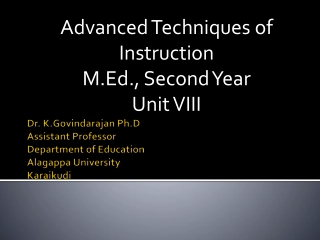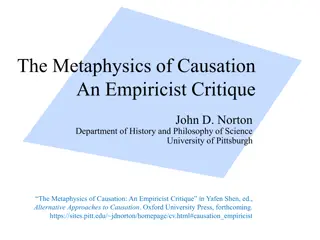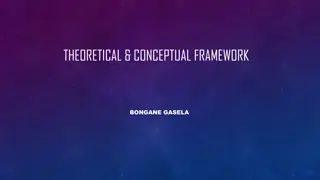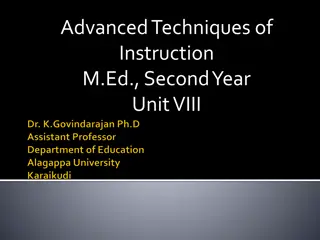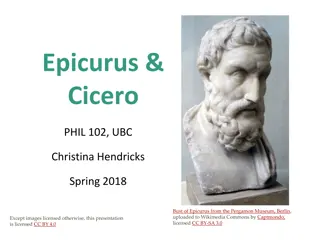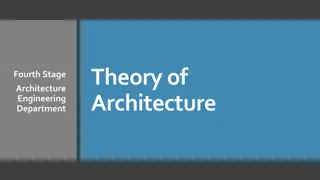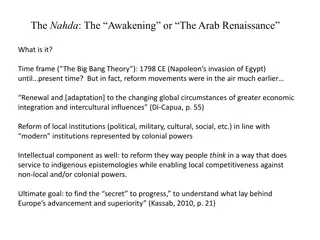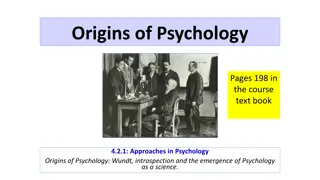Understanding Different Learning Theories and Instructional Approaches
Learning is defined as a lasting change in behavior resulting from experiences. Behaviorism, Cognitivism, and Constructivism are key theories influencing instructional design. Teachers play a crucial role in providing effective learning experiences. Empiricism and Rationalism have historically shape
2 views • 30 slides
Critique of Causal Metaphysics and Empiricism
In this content, the author critiques the metaphysics of causation from an empiricist perspective, exploring the limitations of empiricism in understanding the contingent truths of the world. It discusses causal antifundamentalism, various forms of skepticism, including Humean skepticism, and challe
4 views • 55 slides
Exploring Empiricism: Francis Bacon and Classical Perspectives
Empiricism, as championed by Francis Bacon, emphasizes the role of sensory experience in forming ideas over innate notions. It asserts that the human mind is like a tabula rasa, developing solely through observation and experimentation. Various forms of empiricism, such as explanatory and genetic em
0 views • 9 slides
Understanding Theoretical and Conceptual Frameworks in Research
The theoretical and conceptual frameworks in research play vital roles by grounding studies in theoretical constructs, enhancing rigor and empiricism, and guiding the research process. The theoretical framework provides a blueprint based on existing theories, guiding researchers in developing their
0 views • 12 slides
Understanding Learning Theories in Instructional Design
Learning is defined as enduring behavior change resulting from experiences. Behaviorism, Cognitivism, and Constructivism are key theories in instructional design. Teachers must cater to learners' needs for effective behavior changes. Empiricism and rationalism have historically influenced epistemolo
0 views • 30 slides
Understanding John Locke's Philosophy on Knowledge and Innate Ideas
John Locke, a prominent philosopher, delved into the concept of knowledge, emphasizing certainty and instructiveness. He defined knowledge as perceiving connections or disparities of ideas, distinguishing between innate ideas and those acquired externally. Locke believed innate ideas were not univer
0 views • 8 slides
Philosophy in Ancient Greece: Epicurus and Cicero
Explore the philosophical ideas of Epicurus and Cicero, key figures in ancient Greek and Roman philosophy. Learn about Epicurus' emphasis on empiricism, his views on the nature of the universe, and his concepts on gods and the soul. Delve into Cicero's dialogues and philosophical perspectives preval
0 views • 18 slides
Understanding Learning: Definitions, Theories, and Approaches
Learning is defined as the process of acquiring knowledge and behavior through experience or study, resulting in a relatively permanent change. This includes discussions on behavioral potentiality, instincts, cognitive aspects, and different types of learning such as classical conditioning and cogni
0 views • 33 slides
Rationalism vs. Empiricism in Philosophy: A Comparative Exploration
Rationalism and empiricism are contrasting philosophical theories regarding the sources of knowledge. Rationalists emphasize reason and deductive logic, asserting that certain principles are inherently true, while empiricists argue that knowledge primarily comes from sensory experience and observati
0 views • 10 slides
Understanding J.S. Mill's Justification of Utilitarianism
J.S. Mill's Utilitarianism posits that actions are morally right if they promote happiness and wrong if they lead to unhappiness. Mill's proof of the principle of utility is based on empiricism and the desire for happiness as a desirable end. He argues that happiness is inherently desirable based on
0 views • 20 slides
Emerging Trends in Arab Renaissance and the Evolution of Arabic Literature
The Nahda, or Arab Renaissance, initiated in the late 18th century, marked a period of reform and adaptation in Arab societies, aiming to align with modern institutions and promote intellectual advancement. This movement sought to embrace progress, foster rationality, and understand civilization's r
0 views • 5 slides
Newtonian Determinism and Philosophy: A Critical Examination
Within Newton's philosophical framework, the interplay between causality, determinism, and empiricism shapes his views on space, time, and the nature of reality. Examining his rules of reasoning and the implications of Newtonian determinism, we delve into the philosophical underpinnings of his scien
0 views • 16 slides
Understanding Motivations and Methods in Translation Research
Delve into the complex intertwining of subjectivity and objectivity in translation research, exploring the role of motivations, ideologies, and knowledge dissemination. Discover the application of strong empiricism in formulating hypotheses, testing validity, and refining understanding through data
0 views • 21 slides
Exploring Innatism vs. Empiricism in Philosophy
Innatism posits that certain ideas or concepts are innate to the mind, while Empiricism suggests that all ideas stem from sensory experiences. This discussion delves into the arguments for and against innatism, provides examples supporting each view, and questions the persuasiveness of innatism in u
0 views • 27 slides
Rhetorical Approach to Translation Studies: Challenges and Perspectives
This study explores the emergence of a rhetorical approach in Translation Studies, aiming to counter empiricism and highlight the importance of subjectivity and interpretation in translation. By examining paradigms in Translation Studies, it contrasts the scientistic drive for objectivity with a hum
0 views • 34 slides
Origins of Psychology: From Wundt to the Emergence of a Science
Psychology, emerging in 17th to 19th century philosophy, shifted from experimental philosophy to a science. Influenced by Descartes, Locke, and Darwin, it explored the mind-body connection, empiricism, and evolutionary theories. Wilhelm Wundt, termed the father of psychology, pioneered the field by
0 views • 18 slides
